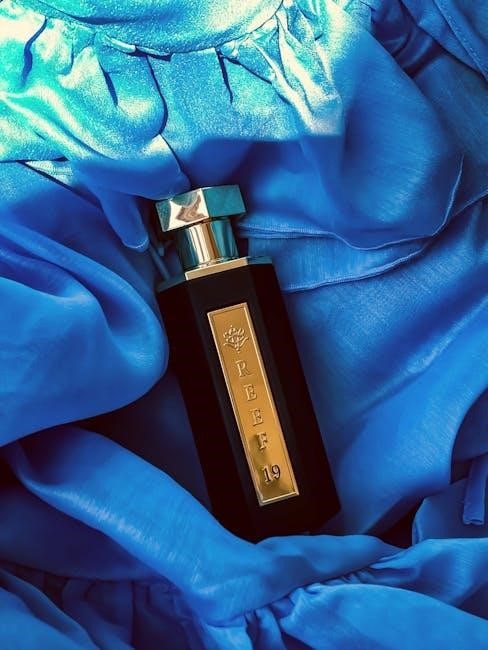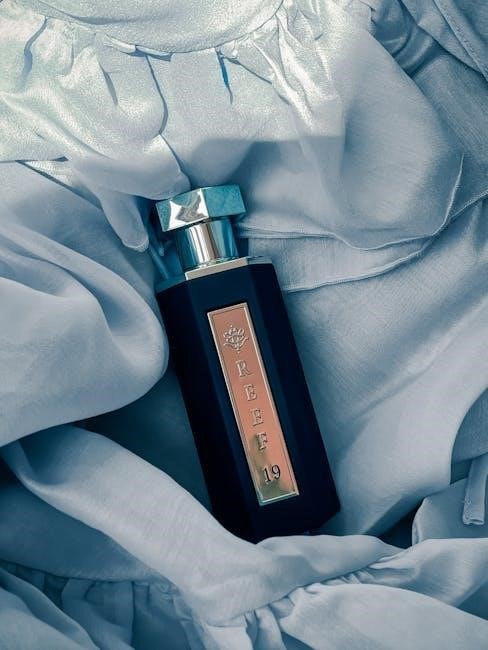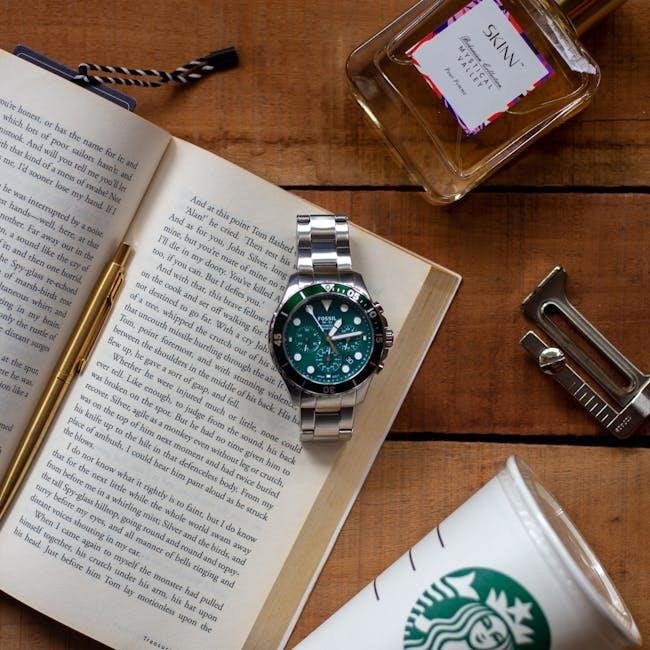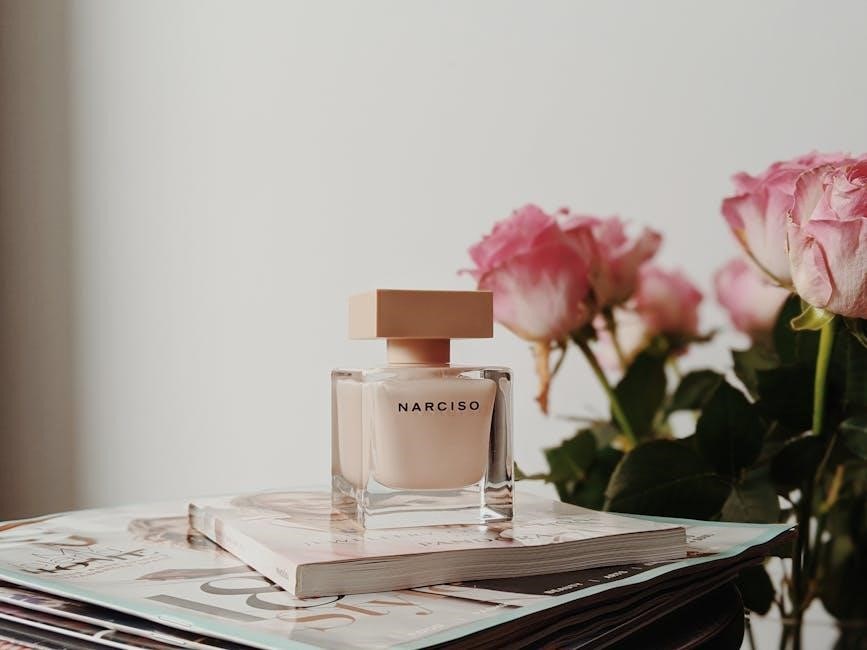Patrick Süskind’s Perfume is a chilling narrative of obsession, centered on Jean-Baptiste Grenouille’s extraordinary olfactory gift in 18th-century France, intertwining beauty and depravity seamlessly.
Overview of the Novel’s Plot and Themes
Set in 18th-century France, Perfume: The Story of a Murderer by Patrick Süskind follows the life of Jean-Baptiste Grenouille, a man with an extraordinary sense of smell. Abandoned as a child, Grenouille discovers his unique gift and becomes obsessed with capturing the perfect scent. His journey leads him to murder young women to extract their essence, culminating in a tragic climax where he uses his perfume to manipulate an entire town. The novel explores themes of obsession, the duality of beauty and depravity, and the dangers of unchecked ambition. It weaves historical and cultural elements, creating a haunting tale of a man driven by his senses to commit unimaginable crimes.
The Author: Patrick Süskind and His Literary Style
Patrick Süskind, a renowned German author, crafted Perfume: The Story of a Murderer with a unique literary style that captivates readers. Known for his meticulous attention to detail, Süskind’s prose is rich and evocative, particularly in his descriptions of scents, which are central to the novel. His writing often blends historical fiction with dark, psychological themes, creating a vivid and immersive experience. Süskind’s ability to weave intricate narratives and develop complex, often unsettling characters, like Jean-Baptiste Grenouille, has earned him acclaim. His work is not only a compelling story but also a profound exploration of human nature, obsession, and the interplay between beauty and depravity.

The Main Character: Jean-Baptiste Grenouille
Jean-Baptiste Grenouille, abandoned as a child, possesses an extraordinary sense of smell, driving his obsession to create the perfect perfume, leading him from genius to murderer.
Grenouille’s Extraordinary Sense of Smell
Jean-Baptiste Grenouille is blessed—or cursed—with a sense of smell unparalleled in human history. Abandoned as a child, he discovers his extraordinary gift, which sets him apart from others. His ability to detect even the faintest scents becomes both his obsession and his weapon. Grenouille’s nose drives his relentless pursuit of the perfect perfume, allowing him to deconstruct and recreate fragrances with uncanny precision. His sensory gift isolates him, fueling his ambition and darkening his soul. This unique talent ultimately defines his identity, transforming him into a master perfumer and a calculating predator, obsessed with capturing the essence of humanity itself. His sense of smell is both his genius and his undoing.
His Obsession with Creating the Perfect Perfume
Jean-Baptiste Grenouille’s obsession with creating the perfect perfume is rooted in his extraordinary sense of smell and his desire to transcend humanity. Abandoned as a child, he discovers his gift and becomes fixated on capturing the essence of beauty. His journey takes him from apprenticeships with perfumers to dark, isolated experiments. Grenouille’s pursuit of the ultimate fragrance leads him to murder young women to extract their unique scents, believing their essence will complete his masterpiece. This relentless quest consumes him, driving him to commit atrocities while mastering the art of perfumery. His obsession blurs the line between creativity and depravity, defining his tragic and terrifying trajectory.
Transformation from Survivor to Genius to Murderer
Jean-Baptiste Grenouille’s life is a dark evolution from abandonment to brilliance, culminating in horrifying crimes. Born with an extraordinary sense of smell, he survives the harsh streets of Paris, discovering his gift. His talent grows under mentorship, but his obsession with capturing human scents leads him down a perilous path. Grenouille’s genius in perfumery is matched only by his moral decay, as he murders young women to extract their essence. His isolation and fixation on creating the perfect perfume consume him, transforming him from a survivor into a calculating murderer. This tragic metamorphosis underscores the destructive power of obsession, leaving behind a trail of death and shattered lives in 18th-century France.

Key Themes in “Perfume”
The novel explores themes of obsession, identity, and the duality of beauty and depravity, delving into the darker aspects of human nature and societal hierarchy.
The Power of Obsession and Its Consequences
Jean-Baptiste Grenouille’s obsession with scent drives him to extreme lengths, showcasing the destructive power of single-minded passion. His extraordinary sense of smell fuels his relentless pursuit of the perfect perfume, leading him to commit heinous crimes. Grenouille’s fixation ultimately consumes him, transforming him from a survivor into a murderer. The novel highlights how obsession can distort morality and isolate individuals, as Grenouille sacrifices everything for his craft. His actions provoke fear and chaos, illustrating the devastating consequences of unchecked ambition. Through Grenouille’s journey, Süskind explores the psychological and societal impact of obsession, revealing its capacity to destroy both the individual and those around them.
The Duality of Beauty and Depravity
The novel masterfully explores the duality of beauty and depravity through Grenouille’s journey. His extraordinary sense of smell allows him to create exquisite perfumes, symbolizing beauty and artistry, yet his obsession leads him to commit horrific crimes. The perfume he creates is a reflection of his twisted soul, captivating others while masking his moral decay. This duality is mirrored in the societal context, where the allure of beauty often hides darker truths. Grenouille’s story serves as a metaphor for the coexistence of beauty and depravity, highlighting the tension between artistic genius and moral corruption. This theme resonates deeply, challenging readers to confront the darkness that can accompany extraordinary gifts and desires.
Social Hierarchy and Class Distinctions
The novel vividly portrays 18th-century France’s rigid social hierarchy, where class distinctions dominate every aspect of life. Grenouille’s journey reflects his struggle to transcend his lowly origins, using his talent to infiltrate elite circles. The societal divide is stark, with the wealthy indulging in luxury while the poor survive in squalor. Grenouille’s perfumes momentarily dissolve these barriers, as his creations evoke universal emotions, uniting people across classes. However, the novel critiques the superficiality of social structures, showing how easily they can be manipulated. The orgy scene exemplifies this, as class distinctions collapse under the influence of Grenouille’s perfume, revealing the fragility of social norms. This exploration underscores the tension between individuality and societal expectations in a rigidly stratified world.

The Climactic Scene and Its Implications
Grenouille’s final act of manipulation, using his perfume to ignite an orgy, dissolves social barriers, revealing the profound power of scent to control and unite humanity universally.
Grenouille’s Use of Perfume to Manipulate Emotions
Jean-Baptiste Grenouille’s mastery of scent allows him to manipulate emotions on a mass scale. His final perfume, crafted from the essence of innocence, transforms hatred into adoration, sparking an uncontrollable orgy. This demonstrates the profound power of scent to override rationality, as the townspeople, driven by primal desire, abandon societal norms. Grenouille’s creation not only controls emotions but also erases moral boundaries, revealing the darker side of human nature. His ability to orchestrate such a response underscores the psychological depth of his craft, blending beauty with depravity. This scene highlights the devastating potential of obsession and the fragility of human restraint in the face of overwhelming sensory manipulation.
The Orgy Scene: Breaking Social Barriers
The orgy scene in Perfume is a pivotal moment where social hierarchies collapse under the influence of Grenouille’s perfume. The scent, designed to evoke pure love and desire, ignites uncontrollable passion among the townspeople. Grandfathers embrace virgins, apprentices pair with nuns, and class distinctions vanish as inhibitions dissolve. This chaotic breakdown of moral and social norms reveals the primal nature of humanity, stripped of civilized restraint. The scene underscores Grenouille’s mastery of human psychology through scent, as well as the fragility of societal structures. It serves as a climax to his obsession, showcasing both the power of his creation and the darker aspects of human nature unleashed by its influence.
The Psychological Impact on the Townspeople
The psychological impact of Grenouille’s perfume on the townspeople was profound and devastating. The scent, designed to manipulate emotions, triggered uncontrollable desire and euphoria, leading to mass hysteria and moral disintegration. Many experienced confusion and guilt in the aftermath, unable to comprehend their actions during the orgy. The loss of inhibitions and societal norms left deep emotional scars, as individuals grappled with the consequences of their primal behavior. The event shattered the townspeople’s sense of identity and morality, leaving a lasting trauma that resonated throughout their lives. This psychological upheaval underscores the darker aspects of human nature, revealing how easily civilized behavior can be stripped away by external influences.

The Historical and Cultural Context
Set in 18th-century France, the novel explores a society marked by rigid class distinctions and moral hypocrisy, influencing Grenouille’s descent into madness and depravity.
Setting: 18th-Century France and Its Significance
The novel is set in 18th-century France, a time of enlightenment and social upheaval. This era provides a rich backdrop for Grenouille’s story, as the contrasts between luxury and poverty, sophistication and brutality, mirror his own inner turmoil. The setting highlights the rigid social hierarchy and moral hypocrisy of the period, which shapes Grenouille’s isolation and ambition. France’s cultural and historical context, including its fascination with perfumery and the rising influence of rational thought, underscores the novel’s themes of obsession and the pursuit of perfection. The setting not only grounds the story in a specific time and place but also serves as a metaphor for the darker aspects of human nature and society.
Historical Figures and Their Influence on the Narrative
The novel subtly alludes to historical figures of 18th-century France, such as the Marquis de Sade, Louis Antoine Saint-Just, Joseph Fouché, and Bonaparte, who embody brilliance, arrogance, and misanthropy. These figures’ reputations for ruthlessness and ambition parallel Grenouille’s relentless pursuit of perfection in perfumery. While they are not direct characters, their influence shapes the narrative’s exploration of obsession, power, and moral decay. The historical context of France’s Enlightenment and Revolution underscores the novel’s themes of social upheaval and the duality of human nature. By invoking these figures, Süskind highlights the era’s contradictions, reinforcing the story’s dark and complex tone. This historical backdrop enriches the narrative, offering a broader commentary on human ambition and depravity.

The Legacy of “Perfume”
Perfume has become a cultural phenomenon, inspiring film adaptations and captivating readers worldwide. Its haunting story of obsession and sensory mastery continues to resonate, making it a timeless classic.
Adaptations and Popular Cultural Impact
Patrick Süskind’s Perfume has transcended literature, inspiring various adaptations and deeply influencing popular culture. The 2006 film adaptation, directed by Tom Tykwer and starring Ben Whishaw, brought Grenouille’s haunting story to the screen, receiving mixed reviews but sparking widespread discussion. The novel’s themes of obsession and sensory mastery have also inspired music, art, and even perfumery, with creators drawing inspiration from its unique narrative. Its exploration of human darker impulses continues to captivate audiences, solidifying its place as a cultural touchstone. The book’s enduring popularity highlights its ability to resonate across mediums, making it a timeless and thought-provoking work that lingers in the imagination long after the final page.
Reception and Reviews of the Novel
Perfume has garnered widespread acclaim for its unique storytelling and dark themes. Critics praise its narrative brilliance, with Publishers Weekly describing it as “chillingly like a well-documented case history of lunacy.” The Christian Science Monitor hailed it as an “original, gruesome, compelling novel.” Readers are drawn to its haunting exploration of obsession and sensory mastery. While some find the graphic violence unsettling, others applaud its unflinching portrayal of human depravity. The novel’s popularity endures, with many seeking its PDF version to experience Grenouille’s chilling journey firsthand. Its impact remains undeniable, solidifying its place as a modern literary classic.

Accessing the Novel in PDF Format
Find the PDF legally through purchase from official sources or borrow from libraries. Platforms like Amazon or Google Books offer digital copies, ensuring copyright respect and author support.
Where to Find the PDF Version Legally
To access Perfume: The Story of a Murderer in PDF legally, consider purchasing it from reputable online retailers like Amazon, Google Books, or Barnes & Noble. Many platforms offer eBook versions compatible with various readers. Additionally, libraries often provide digital borrowing options through services like OverDrive or Libby, allowing you to read the book without purchasing. Ensure you avoid unauthorized websites to respect copyright laws and support the author. Purchasing legally guarantees high-quality formatting and contributes to the creator’s work. Always verify the seller’s authenticity to avoid downloading corrupted or incomplete files. Legal access ensures a seamless and ethical reading experience for Patrick Süskind’s masterpiece.
Importance of Reading the Novel in Its Original Form

Reading Perfume: The Story of a Murderer in its original form ensures an authentic and immersive experience of Patrick Süskind’s masterpiece. The novel’s intricate narrative, rich descriptions, and psychological depth are preserved in the original text, allowing readers to fully grasp Grenouille’s obsession and the duality of beauty and depravity. The carefully crafted language and structure, translated from German by John E. Woods, are integral to the story’s impact. Unauthorized or altered versions may lack this precision, diminishing the novel’s emotional and intellectual resonance. Engaging with the original text supports the author’s intent and provides a more profound connection to the themes and characters. It is essential for a meaningful and complete understanding of this literary work.
